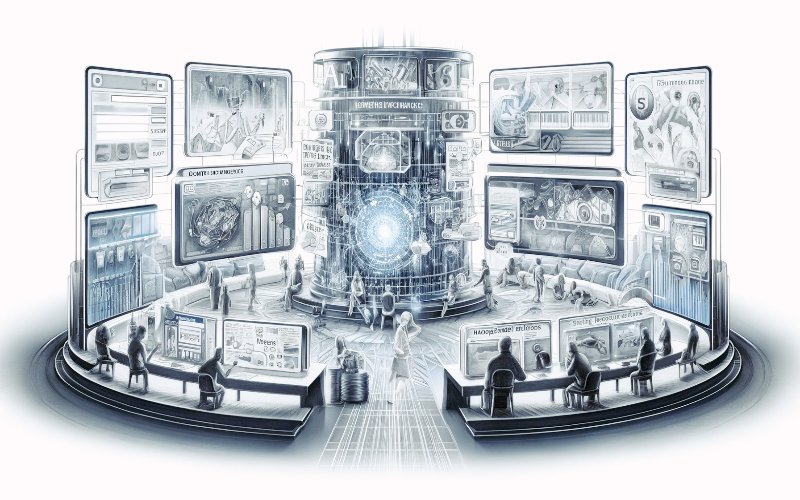
In today’s digital age, AI-Powered Recommendation Engines are transforming the way we interact with content, products, and services online. These engines, fueled by artificial intelligence, make predictions based on user behavior and preferences, creating a personalized experience that keeps users engaged and returning for more.
What Are AI-Powered Recommendation Engines?
Understanding AI-Powered Recommendation Engines
AI-Powered Recommendation Engines are systems that use algorithms to analyze user behavior, preferences, and historical data, providing personalized recommendations to users. Unlike traditional recommendation systems, these engines can process vast amounts of data in real-time, refining their suggestions as they gain more information on user interactions.
These engines are able to detect patterns through machine learning, clustering similar users or items to provide tailored suggestions. The intelligence behind these engines lies in their ability to learn and adapt continually, enhancing personalization with every interaction.
How AI Transforms the Recommendation Process
AI has introduced a revolutionary level of predictive accuracy and personalization to recommendation processes. There are three main types of filtering methods used in AI-Powered Recommendation Engines.
- Collaborative Filtering: This method analyzes user behavior and preferences, recommending items based on similar users’ choices.
- Content-Based Filtering: Here, recommendations are based on the attributes or features of items, such as the genre of a movie or the style of a product.
- Hybrid Approaches: Combining collaborative and content-based filtering, hybrid models increase accuracy and relevance by leveraging both user and item data.
Together, these methods allow AI-Powered Recommendation Engines to provide a refined recommendation experience that can adapt and evolve over time.
Industries Leveraging AI-Powered Recommendation Engines
AI in E-commerce, Streaming, and Social Media
AI-Powered Recommendation Engines are applied across a variety of industries, each leveraging them to enhance user experience and drive business goals:
- E-commerce: Platforms like Amazon use recommendation engines to suggest products based on users’ browsing history and purchase history, increasing conversion rates and customer satisfaction.
- Streaming services: Netflix, Spotify, and other streaming giants use AI to recommend media content by analyzing viewing habits and preferences, ensuring users find new content that resonates with them.
- Social media: On platforms like Facebook and Instagram, AI-Powered Recommendation Engines personalize content feeds, ad placements, and even friend suggestions, improving user engagement and ad targeting.
Across these industries, AI-Powered Recommendation Engines are pivotal in shaping user experiences and driving revenue.
Benefits of AI-Powered Recommendation Engines
Enhancing User Engagement and Business Outcomes
AI-Powered Recommendation Engines offer significant benefits to both users and businesses:
- Increased Engagement: Personalizing content recommendations keeps users engaged, increasing time spent on the platform and likelihood of return visits.
- Improved User Experience: AI-Powered Recommendation Engines make it easy for users to discover relevant content without exhaustive searching, offering convenience and satisfaction.
- Higher Conversion Rates: In e-commerce, targeted product recommendations can increase sales by presenting users with items they are likely to purchase.
By enhancing both engagement and convenience, these engines make it easier for businesses to achieve customer satisfaction and loyalty.
The Technology Behind AI-Powered Recommendation Engines
Exploring Machine Learning, NLP, and Deep Learning
AI-Powered Recommendation Engines rely on advanced technologies that empower them to deliver accurate recommendations:
- Machine Learning: Using algorithms to detect patterns and make predictions, machine learning enables these engines to continuously improve with more data.
- Natural Language Processing (NLP): Especially relevant in text-heavy environments, NLP enables engines to understand and interpret user sentiment, enhancing content recommendations.
- Deep Learning: This approach mimics the neural networks in the human brain, capturing complex patterns and relationships in data, which improves recommendation accuracy.
These technologies collectively allow AI-Powered Recommendation Engines to provide dynamic, personalized recommendations in real-time.
Data Privacy Concerns and Ethical Considerations
Balancing Personalization with Privacy in AI-Powered Recommendation Engines
While AI-Powered Recommendation Engines offer exciting capabilities, they also raise questions about data privacy and ethics. Since these engines rely on extensive user data to function, maintaining privacy and transparency is crucial to build user trust.
Moreover, ethical concerns about biased recommendations can arise. If recommendations consistently present similar types of content, users may experience a lack of diversity. Ensuring transparency in algorithms and implementing fairness measures helps mitigate these challenges and provides users with a balanced experience.
Challenges in Building Effective AI-Powered Recommendation Engines
Overcoming Data, Complexity, and Scalability Issues
Developing effective AI-Powered Recommendation Engines presents a unique set of challenges:
- Data Quality and Quantity: Quality data is essential for making accurate recommendations, and insufficient or irrelevant data can hinder performance.
- Algorithm Complexity: Designing algorithms that are accurate, diverse, and unbiased requires careful testing and frequent updates.
- Scalability: As the amount of data increases, recommendation engines must scale to accommodate growth without losing speed or accuracy.
These challenges underscore the importance of thoughtful design and ongoing optimization in AI-Powered Recommendation Engines.
Future Trends in AI-Powered Recommendation Engines
The Evolution Toward Contextual and Explainable Recommendations
The future of AI-Powered Recommendation Engines looks promising, with several trends on the horizon that will improve personalization and transparency:
- Contextual Recommendations: Future engines may consider factors like time, location, or user mood, making recommendations even more relevant.
- Explainable AI: Providing explanations for recommendations can build trust and transparency, helping users understand why certain items were suggested.
- Increased Personalization: New developments in AI may soon allow for recommendations tailored to individual personalities or even current moods, enhancing the user experience.
These trends signal that AI-Powered Recommendation Engines will become even more attuned to individual preferences and context, further enhancing their role in digital personalization.
The Impact of AI-Powered Recommendation Engines on User Behavior
Influencing How People Discover and Engage with Content
AI-Powered Recommendation Engines significantly impact user behavior, shaping how individuals interact with content, products, and media. These engines streamline the user experience, helping people discover new items they enjoy without having to search manually.
By making relevant content easily accessible, AI-Powered Recommendation Engines encourage users to explore new products, media, or services, ultimately driving satisfaction and loyalty.
Conclusion:
Embracing the Potential of AI-Powered Recommendation Engines
AI-Powered Recommendation Engines represent a leap forward in delivering personalized user experiences. By analyzing user data and preferences, these engines enhance engagement, improve user satisfaction, and boost conversions. As AI technology advances, recommendation engines will become even more precise and intuitive, offering a transformative benefit to users and businesses alike. Embracing these engines’ potential could reshape the future of digital personalization.
Also visit on techitl.com.



